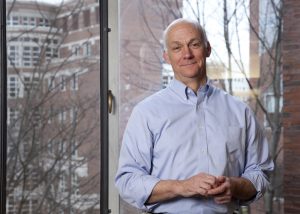Harvard’s William Clark Hails Sustainability Science as a Key to Long-Term Local, Global Well-Being
 Sustainability science is not, at its core, about innovation or high-tech advancement. It is, first and foremost, an exercise in humility, an approach that requires the elusive skills of listening and patience. Academic agendas? Leave them at the door.
Sustainability science is not, at its core, about innovation or high-tech advancement. It is, first and foremost, an exercise in humility, an approach that requires the elusive skills of listening and patience. Academic agendas? Leave them at the door.
“It may not be what we went into science and technology looking for,” said William Clark of Harvard’s John F. Kennedy School of Government. Clark gave the keynote address at the Senator George J. Mitchell Lecture on Sustainability on Oct. 2. Working toward a sustainable future on our planet is “about the concerns, hopes and fears of stakeholders,” Clark added. “It’s about listening instead of talking.”
The annual lecture is hosted by the Senator George J. Mitchell Center for Sustainability Solutions (Mitchell Center) with a goal to bring together people from across Maine who seek to understand the intersecting economic, social and environmental challenges and opportunities faced by communities, as well as to present constructive options that will facilitate a renewed commitment to the development of collaborative approaches to problem solving.
David Hart, Director of the Mitchell Center, credited Clark as one of the co-founders of the emerging field of sustainability science. “Bill’s work suggests that universities have great potential to help society solve sustainability problems. To reach this potential, however, they need to mobilize their full complement of expertise in the many different facets of sustainability challenges – not just expertise in natural science and engineering, but also in the social sciences, arts and humanities” said Hart.
Clark, Harvey Brooks Professor of International Science, Public Policy and Human Development, sang the praises of sustainability science, which promotes research collaborations between universities, government, the private sector, and civil society. The goal is to engage diverse values and viewpoints to achieve real world solutions – meetings of minds that favor long-term benefits to individuals and society.
“It’s about the well-being of individual people here and on the other side of the world, rather than doing well at someone else’s expense,” Clark said in a talk early Thursday with faculty and students. See more on this story
